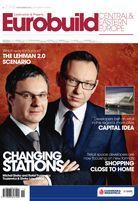Estonia The debate on what kind of country Estonia is - Scandinavian or Baltic - continues to rage, but when it comes to architecture the answer is clear: both. Between September 8th and 11th the first international Tallinn Architecture Biennale took place, offering a variety of events, such as exhibitions, a vision competition, a symposium, lectures, discussions, workshops and guided tours of various quarters of the Estonian capital. Contemporary Estonian architecture is often regarded these days as one of the most remarkable to watch, but interestingly enough it is still keeping a low profile. But the message is clear: things are now starting to change.Fresh start"One and a half years ago I became the vice-chairman of the Union of Estonian Architects. My responsibilities included the organising of events and publications. Estonia lacked an international architectural event back then. This year the Union of Estonian Architects also celebrates its 90th birthday," explains Villem Tomist




























































